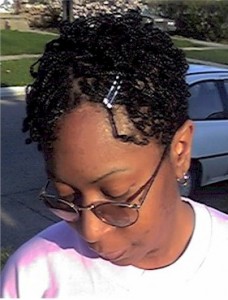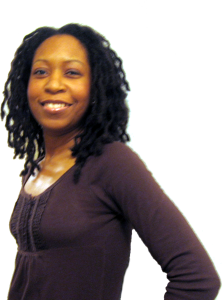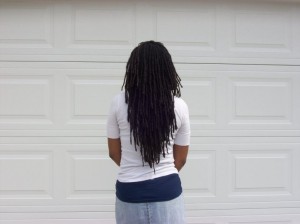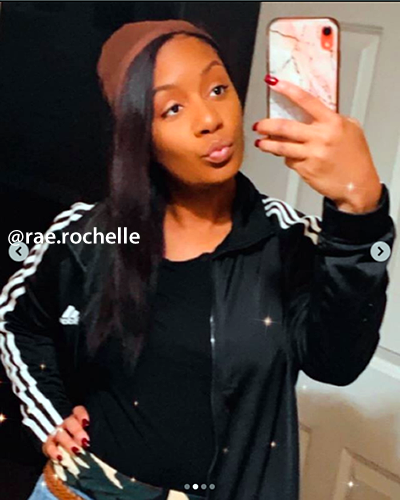Inside: If you’ve ever heard or believed that black women can’t grow their hair long, learn the truth plus some tips to help you grow your hair longer.
Have you ever heard that, “black women can’t grow long hair”?
It seems as though anytime a (Black) woman has hair that reaches past her shoulder blades, the question of her race and/or whether or not the hair is “all hers” comes up.
I’m sure you’ve heard, and maybe even said, before…

Back when I used to do hair, a lot of women would say to me,
“Cherie, my hair just doesn’t grow!”
And I’d reply…
“Umm, yes it does! If it wasn’t, you wouldn’t need to see me every 4-6 weeks for a touch-up!”
I’d then go on to explain…
“… As fast as your hair shows growth at the roots, it’s breaking off on the ENDS from all the combing, styling, heat, over-processing, etc. and THAT’S why it seems as though your hair isn’t growing!”
But the truth is, our hair CAN grow long… it just needs the right conditions.
I’ve seen women with hair down their backs and NO, not all of them were wearing locs.
Some of them even had relaxed hair, although it is a rarity.
And it’s NOT because of our race, and it’s NOT because “our hair” doesn’t, can’t or won’t grow. But it’s due to other factors – many of which we can control and change, as you’ll read in a moment!
Today we’re going to uncover:
- Reasons some Black women don’t see visible length
- How I ended up with waist-length hair
- Bonus tips if you don’t want to necessarily go the same route I did
Reasons Some Black Women Don’t See Visible Length
Let’s dive a little deeper and take a look at some of the most common reasons there seems to be a lack of long hair growth among Black women.
1. Chemicals
Okay, let’s keep it real. If you are using chemical relaxers, there is a GREAT potential for inevitable damage to your hair – if for no other reason than the sheer science behind how they (relaxers) work.
Hair is made up of bonds (hydrogen, salt, and disulfide) and relaxers break these bonds, making the hair more susceptible to breakage.
And when over-processing occurs – which is more often the case than not – it makes matters even worse! However, when done correctly (not over-processing or overlapping) and much care is given to nurture it, even relaxed hair can grow long. You’ve just gotta treat it with great care and not do a lot of the things many black women like to do to their hair, such as using excessive heat.
2. Medications
If you’re taking certain meds, be well aware that there is a strong possibility your hair woes may be caused by them, whether in full or in part.
According to Hair Doc, some of the most commonly-known medications that cause issues with hair loss are:
-
- certain cholesterol drugs: clofibrate, gemfibrozil (Lopid)
- some Parkinson’s medications: levodopa (Dopar, Larodopa)
- common ulcer medications: cimetidine (Tagamet), ranitidine (Zantac), and famotidine (Pepcid).
- high blood pressure beta-blocker medications: Atenolol (Tenormin), metoprolol (Lopressor), nadolol (Corgard), propranolol (Inderal), and timolol (Blocadren)
- anticoagulants (blood thinners): warfarin, coumarin, and heparin.
- gout medication: allopurinol (Zyloprim).
- arthritis medications that may cause hair loss include: penicillamine, indomethacin (Indocin), naproxen (Naprosyn), sulindac (Clinoril), methotrexate (Folex)
- and others that you can read more about here
3. Diet
If your diet is high in (unhealthy) fat, carbs, etc. and low in healthy, nutritional foods, this could play a part in any hair drama you’re suffering from. Iron, zinc, niacin, and fatty acid deficiencies are but a few nutrient-related causes of hair loss.
This is why many “hair supplements” feature such nutrients as the aforementioned, along with biotin, selium and others.
If you’re not eating the best diet, then you may want to consider a good quality nutritional supplement, with high absorbability, to fill in any gaps.
4. Stress
Stress is a major culprit in so many things we suffer: hair loss/breakage, weight gain, and more.
I realize that life sometimes throws us some mean curves, but it’s important to find ways to deal with those things (prayer, meditation, yoga, etc.) as opposed to allowing yourself to become stressed out to the point of it affecting your health and the health of your hair.
5. Excessive Combing, Styling & Use of Heating Implements
Okay, I’m gonna go out on a limb and say that aside from over-processing with relaxers, THIS is the biggest culprit to the hair dilemma that most Black women face.
All the combing, using the WRONG combs, curling, pressing, flat ironing, etc. takes a major toll on the hair – making it snap off in a heartbeat.
That’s why when it comes to messin’ with your hair, my motto is, “Less is best!“
6. Styles Done Too Tightly
Yep, even something as “innocent” as the beloved ponytail can cause hair damage, loss and/or breakage when they’re worn too tightly, too frequently, or both.
And we won’t even talk about excruciatingly-tight braids and weaves! No hair style is worth potentially permanent hair loss!
Which one applies to YOUR hair situation?
In my own personal situation, I believe it was the use of chemicals, coupled with all the rigorous styling and heat applied to my hair.
I also believe that my poor diet played a BIG part as well. I thought it would be my fate to never have hair longer than my shoulders, which was odd because as a little girl, I had very long, thick hair.
But once I hit my teens, on into adulthood, I’d get my hair relaxed and then it was like a cycle… growing to the top of my shoulder blade area, then all of a sudden and without warning, my hair would start breaking off on the ends and never get any longer.
But eventually, I came to the realization that the reason this was happening wasn’t all that “odd” after all and, once I made some changes, something that has never happened to me happened…
My hair grew all the way down to my WAIST!
If you’d like to know how it happened, keep reading.
How I Ended Up With Waist-Length Hair
Now, I realize you may not agree with everything I’m about to say, and that’s okay. It’s not meant for everyone. But these tips will help you, even if you choose to follow only a couple of them.

1. Stop chemically processing with relaxers
Yeah, yeah… I know. You don’t want to hear that if you’re currently wearing a relaxer.
But this is not to say you have to stop relaxing your hair. There are women out there with relaxed hair down their backs and it’s healthy… as healthy as it can be.
But come on now. Realistically speaking, you and I both know it’s NOT very common to see.
Again, this is due to the very science behind relaxers, the over-processing that typically occurs in their application, and damaging styling practices. So in essence…
Something needs to change!
You can either:
- continue doing things the way you’ve always done and getting the same result you’ve always gotten…
- keep wearing a relaxer BUT treat your hair better – stop over-processing, stop leaving it on too long trying to make it bone straight, and stop using excessive heat on your hair OR…
- consider transitioning to natural hair
I know even the thought of it can be scary, but you can do it! There are plenty of YouTube videos, Pinterest pics, and books for inspiration and instruction.
In fact, here are a few book recommendations you can check out:
2. Do some internal cleansing

Did you know your colon is where the nutrients from the foods you eat and supplements you take are absorbed into your bloodstream?
So what does this mean for your HAIR?
It means, if your digestive system isn’t functioning in tip-top condition (having a “healthy” bowel movement 2-3 times a day… EVERY day) your colon could be impacted with old feces, thus resulting in nutrients not being properly absorbed.
So all those hair, skin and nails supplements and any other vitamins you’re taking are going to waste.
What’s the solution? Colon cleansing.
And no, I don’t mean run to the store and grab the cheapest laxative you can find, or any laxative for that matter. You need something that’s not gonna irritate your bowel or cause dependency, which is what laxatives do.
Instead, look for something gentle yet effective, and natural.
The first ever colon cleanse product my family and I ever tried is the one we still use today, some 18 years later. We’ve tried others, but nothing seems to work for us quite the same.
If you’d like to learn more about what I personally use…
Click here to learn about my recommended colon cleanse
3. Jump on the road to better health

This occurred by “accident”, but it occurred nonetheless… thankfully.
My husband got very ill in the late 90’s, thus creating a need for changes in his diet. At first I was NOT on board but later realized I’d better get my butt on board.
I did that by, first, increasing my intake of water. Then I began eating more fresh fruits and vegetables and a LOT less junk and processed food.
Later down the road, I began supplementing what I was lacking in my diet (due to being a picky eater) with a liquid vitamin supplement. The one I take provides 243 vitamins and minerals – many of which are healthy hair-specific!
If you’re eating a diet high in processed foods, sugar, bread, and other nutritionally-deficient items, you’re probably lacking many of the nutrients your scalp needs to produce healthy hair.
So if you’re interested in the one I use, you can check it out below BUT… don’t forget to ensure it’s gonna get absorbed properly as I stated previously!
Click here to learn about my recommended vitamin supplement
4. Lessen manipulation…
… in terms of combing, heat styling, etc. by installing what I like to call “permanent braids” or, in other words, Bradelocz! 🙂

And if you’re thinking, “Big deal! Locs grow long anyway.”
Think again because, while locs ARE in a better position for visible length due not being manipulated as much as loose hair; not all locs are created equal.
I’ve seen some very unhealthy locs that are dry, brittle, broken and not very appealing from a ‘healthy hair perspective’.
People often ask what I do to get my locs so soft and healthy because theirs are stiff, dry and brittle.
So it’s NOT just about having locs, but it’s also about incorporating the other tips in this article as well, for maximum results and healthy hair… locked or not.
But locking is definitely a surefire way to greatly minimize manipulation and give your hair a chance to grow, and grow, and GROW!
Click here to learn more about Bradelocz!
So as you can see, I made both outward and inward changes… the inward, in my opinion, being the most significant! As result, my hair grew not only past my shoulders, but ultimately ended up at my waist! What a milestone, right?
“But Cherie, I really don’t want locs”
Listen, I get it. At first, I had my reservations about them too.
And perhaps it’s just not the right time for you to explore locking your hair, even if they can be styled in a lot of the ways loose hair can be styled. I get it.
Well, let me just say that even if you decide to go natural but just not with locs, you can still grow your hair long.
My daughter did it. At one time she was in a cycle of her own where her hair grew no longer than a little past her shoulders.
Now her hair is almost as long as mine!
I told her about the article I was writing and asked her to share with you what she did to FINALLY break the cycle and get her hair where it is now.
The following tips are what she shared with me:


- Wear protective styles: 2-strand twists, hair stretching styles such as banding, curl formers, etc. and, on occasion, lace front wigs over plaited or cornrowed hair.
- Use Mane Choice Hair Growth Oil and/or Doo-Gro
- Minimize heat: She would go 3-6 months straight without using heat on her hair in any form. She even went a whole YEAR with zero heat!
- Keep your hair moisturized: Moisturizing is very important, as dry hair can cause breakage. She used the L.O.C. method (liquid, oil, cream) of moisturizing her hair. For example: L= water, O= jojoba oil or CHI Silk Infusion, and C= Garnier Fructis Buttercream) She didn’t use any one product all the time, she likes to try different things and switch it up, but that’s the general idea… L.O.C. with whatever products you wish to use.
- Co-wash: She suggests shampooing your hair with shampoo only once a month, and to co-wash with conditioner or an actual co-wash product a month in between.
- Be gentle: When detangling, combing and styling, use care and patience. She often finger-combs and styles her hair to ensure she’s not ripping it with the comb.
So if you want long hair and, up to this point, you haven’t been able to achieve it; pinpoint the root cause of why your hair is seemingly not growing and address it using any one or more of the tips I shared today.
Blessings & Warmest Regards,